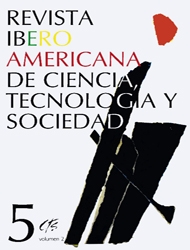Teoría crítica de la tecnología
DOI:
https://doi.org/10.52712/issn.1850-0013-1018Palabras clave:
tecnocracia, instrumentalización, código técnico, resistenciaResumen
Este artículo resume los aspectos centrales de la filosofía de la tecnología de Andrew Feenberg y la ilustra con ejemplos del mundo de la informática. Según esta propuesta, la cuestión central de la filosofía de la tecnología es la preeminencia de la administración tecnocrática y la amenaza que ésta plantea para el completo ejercicio de la agencia humana. El análisis de esta cuestión se lleva a cabo desde la teoría de la instrumentalización, elaboración que se nutre críticamente tanto de comprensiones provenientes de la filosofía de la tecnología esencialista así como del constructivismo de historiadores y sociológicos.
Descargas
Citas
BORGMANN, Albert (1992): Crossing the Postmodern Divide, Chicago, University of Chicago Press.
de CERTEAU, Michel (1980): L’Invention du Quotidien, Paris, UGE.
FEENBERG, Andrew (1991): Critical Theory of Technology, New York, Oxford University Press.
FEENBERG, Andrew (1993): “Building a Global Network: The WBSI Experience”, en L. Harasim (ed.), Global Networks: Computerizing the International Community, Cambridge, Mass., MIT Press, pp. 185-197.
FEENBERG, Andrew (1995): Alternative Modernity: The Technical Turn in Philosophy and Social Theory, Los Angeles, University of California Press.
FEENBERG, Andrew (1999): Questioning Technology, London and New York, Routledge.
FEENBERG, Andrew (2002): Transforming Technology: A Critical Theory Revisited, New York, Oxford University Press.
FEENBERG, Andrew (2003): “Modernity Theory and Technology Studies: Reflections on Bridging the Gap”, en Misa, T., P. Brey y A. Feenberg (eds.), Modernity and Technology, Cambridge, Mass., MIT Press.
FEENBERG, Andrew (2004): Heidegger and Marcuse: The Catastrophe and Redemption of Technology, New York, Routledge.
FEENBERG, Andrew y Darin BARNEY (2004): Community in the Digital Age, Lanham, Rowman and Littlefield.
HEIDEGGER, Martin (1998): “Traditional Language and Technological Language”, trans. W. Gregory, Journal of Philosophical Research XXIII.
MARCUSE, Herbert (1964): One-Dimensional Man, Boston, Beacon Press.
MARCUSE, Herbert (1978): “Beiträge zu einer Phänomenologie des Historischen Materialismus”, en Herbert Marcuse Schriften: Band I, Frankfurt, Suhrkamp Verlag.
STONE, Allurque Rosanne (1995): The War of Desire and Technology at the Close of the Mechanical Age, Cambridge, Mass., MIT Press.
TENNER, Edward (1996): Why Things Bite Back: Technology and the Revenge of Unintended Consequences, New York, Alfred A. Knopf.
TURKLE, Sherry (1995): Life on the Screen: Identity in the Age of the Internet, New York, Simon and Schuster.
Descargas
Publicado
Cómo citar
Número
Sección
Licencia
Derechos de autor 2025 CC Attribution 4.0

Esta obra está bajo una licencia internacional Creative Commons Atribución 4.0.
Todos los números de CTS y sus artículos individuales están bajo una licencia CC-BY.
Desde 2007, CTS proporciona un acceso libre, abierto y gratuito a todos sus contenidos, incluidos el archivo completo de su edición cuatrimestral y los diferentes productos presentados en su plataforma electrónica. Esta decisión se sustenta en la creencia de que ofrecer un acceso libre a los materiales publicados ayuda a un mayor y mejor intercambio del conocimiento.
A su vez, para el caso de su edición cuatrimestral, la revista permite a los repositorios institucionales y temáticos, así como también a las web personales, el auto-archivo de los artículos en su versión post-print o versión editorial, inmediatamente después de la publicación de la versión definitiva de cada número y bajo la condición de que se incorpore al auto-archivo un enlace a la fuente original.











